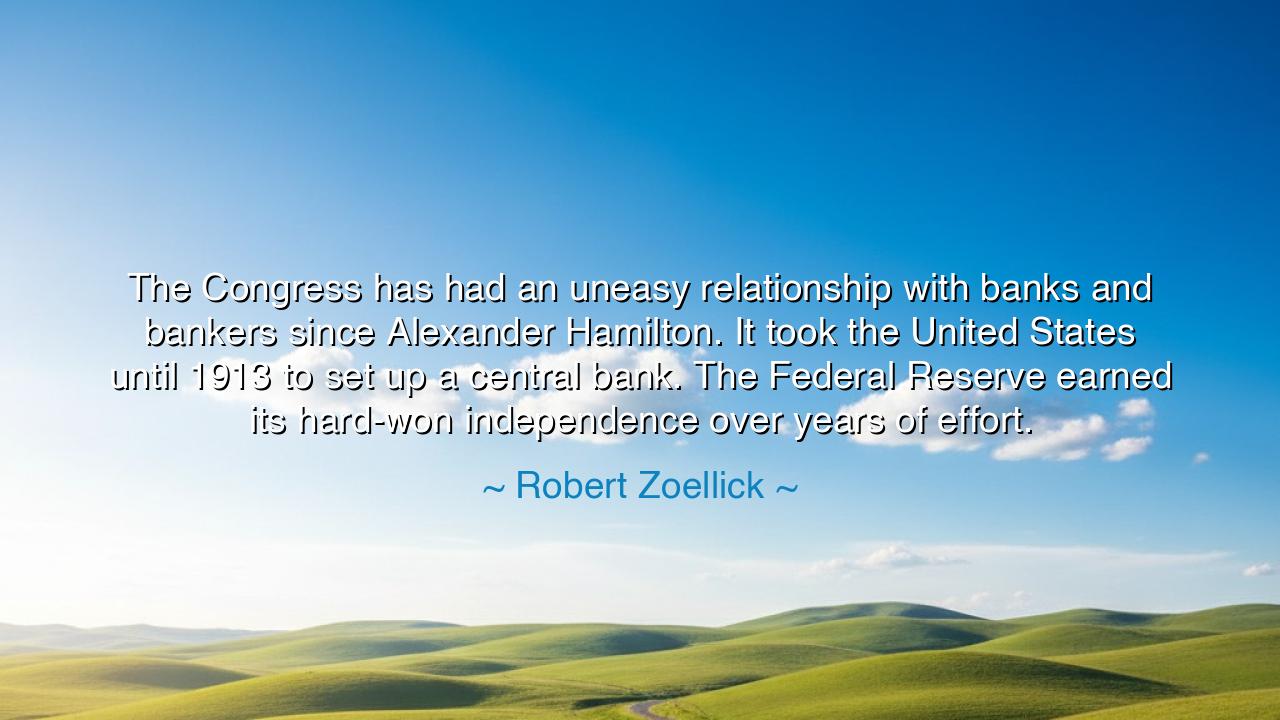
The Congress has had an uneasy relationship with banks and
The Congress has had an uneasy relationship with banks and bankers since Alexander Hamilton. It took the United States until 1913 to set up a central bank. The Federal Reserve earned its hard-won independence over years of effort.






Listen, O children of the future, for the words of Robert Zoellick echo with the wisdom of generations that have grappled with the powerful forces of finance and governance. He reflects on the complex and often uneasy relationship between Congress and the institutions of banking, saying, "The Congress has had an uneasy relationship with banks and bankers since Alexander Hamilton. It took the United States until 1913 to set up a central bank. The Federal Reserve earned its hard-won independence over years of effort." In these words, we find a deep understanding of the tension that lies at the heart of modern finance and government—a tension that has existed since the very founding of the American Republic.
Alexander Hamilton, the first Secretary of the Treasury and a visionary of great influence, recognized early on the power of banking to shape a nation’s destiny. He sought to establish a central bank as the foundation for America’s economic stability, believing that a strong financial system was key to the strength of the new nation. But his ideas were not universally embraced. Thomas Jefferson and others, wary of concentrated power in financial institutions, saw Hamilton’s vision as a threat to the democratic ideals of the Republic. This early clash between Hamilton’s financial vision and the agrarian ideals of the Jeffersonian republic lays the groundwork for the uneasy relationship between Congress and the banking system that Zoellick speaks of.
The Federal Reserve, born out of the struggles of the late 19th and early 20th centuries, became the culmination of a long and arduous journey for financial independence. For years, the United States struggled with the instability of its banking system, subject to panics and crises that threatened to unravel the economy. The creation of the Federal Reserve in 1913 was not simply an act of policy; it was the result of decades of debate, struggle, and the gradual realization that the nation’s financial system needed an independent body to oversee its stability. In this, we see the timeless truth that independence—whether in financial institutions, governments, or individuals—must be earned through dedication, struggle, and the wisdom to recognize what is best for the long-term future.
Consider the story of the ancient Greeks, who built the foundations of democracy and governance with great effort. Solon, one of the great reformers of Athens, recognized the need for balance in his city-state. He introduced laws to curb the power of the aristocracy while ensuring that the common people had a voice in the government. Yet, as in the story of Hamilton and the Federal Reserve, the quest for independence and power often met with resistance. The Athenian democracy would not have been born without a struggle—and much like the establishment of the Federal Reserve, it was not a process of easy agreement but one of competing interests and hard-won victories.
Zoellick’s words remind us that the creation of institutions that stand the test of time is never without difficulty. The Federal Reserve, like the Athenians’ experiments in democracy or the struggles of other great nations to build their systems of governance, took years of effort to secure its independence. It was not just about creating a central bank; it was about ensuring that the bank would operate free from political pressures, able to make decisions that would benefit the nation’s long-term prosperity, not just the short-term interests of those in power.
And so, O children, the lesson from Zoellick's words is clear: independence—whether for an institution or an individual—is not a gift that is given; it is something that must be earned through struggle, vision, and resilience. The Federal Reserve did not come into being overnight, nor did the American financial system come to be without its conflicts. Similarly, your own independence—whether in your thoughts, actions, or ambitions—must be forged through dedication and perseverance, through the courage to face opposition, and through the wisdom to understand what is best for your future.
Take this wisdom into your own lives, O heirs of the future. Know that true independence is not simply a matter of breaking free from external forces, but of building something strong, resilient, and lasting. Whether in your work, in your ideas, or in your pursuit of freedom, understand that independence requires not just the desire for it, but the effort to achieve it. Like the Federal Reserve, like Hamilton, like the Greeks, you too must learn the value of struggle, vision, and patience in securing the independence that will sustain you in the long run.
May you, like those who came before you, rise to face the challenges of your time with the wisdom to understand that independence is not a gift but a journey. The future, like the past, belongs to those who have the courage to fight for their freedom, to build their own systems of justice and stability, and to ensure that those institutions can stand strong through the trials of time.






AAdministratorAdministrator
Welcome, honored guests. Please leave a comment, we will respond soon